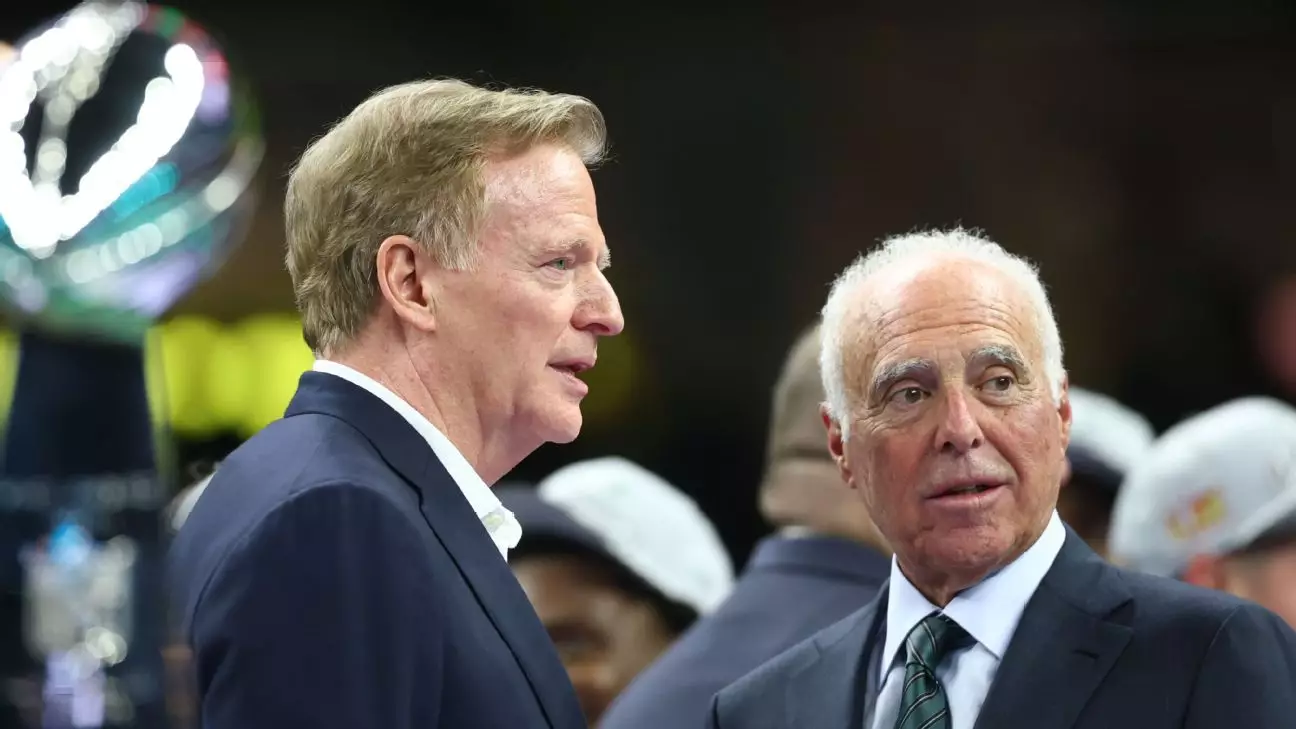In a heated atmosphere characterized by conflict and contrasting visions for the future of the NFL, the contentious debate surrounding the so-called “tush push” play ignited an intense exchange among league owners during their recent meeting in Eagan, Minnesota. A significant focal point for discussions, the tush push has become emblematic of the league’s struggle to balance tradition, safety, and competitive integrity in a rapidly changing sports landscape. While one could argue that players’ safety should reign supreme, this dialogue revealed that the heart of the NFL beats strongest when controversy arises.
Eagles owner Jeffrey Lurie took the center stage, wielding his words like a skilled orator determined to breach the fortress of opposition to defend his team’s strategic success. Lurie’s passion for the play wasn’t merely professional; it was deeply personal, reflecting a commitment to innovation and aggression in gameplay that other teams may envy. The “tush push” has been a game-changer for the Eagles, creating a tactical advantage that most teams would be eager to replicate but struggle to execute. Yet, it’s not just about wins; it touches on the broader themes of adaptability and embracing the evolution of the game.
Lurie’s Passionate Appeal: A Hail Mary for the Tush Push
The dramatic narrative unfolded as Lurie, clearly aware of the winds shifting against him, crafted an impassioned defense that played upon both nostalgia and the necessity of risk. “He pulled out all the stops,” a source remarked, alluding to Lurie’s realization that he was fighting an uphill battle. Yet, instead of receding in the face of challenges, he used the moment to draw on a poignant analogy— likening the thrill of creating a play so successful that it verges on being banned to a teenage boy’s fantasy. Such vivid imagery calls into question the cultural perceptions of athletes and the power dynamics inherent in the sport.
Certainly, Lurie’s remarks drew criticism from NFL executive Troy Vincent, illuminating the complexities of discussing sportsmanship and gender within a traditionally male-dominated space. By drawing laughter with his colorful analogy, Lurie inadvertently shifted the focus from a strategic discussion to one that, while amusing, created an uncomfortable tension in the room. Vincent’s rebuke serves as a reminder that the language of sports needs to evolve, mirroring societal shifts alongside the game itself.
Pressure from Within: A Divided League
The assembly featured a tension-filled atmosphere, as owners from various franchises displayed their stances, torn between personal interests and the collective vision of the league’s direction. Dallas Cowboys owner Jerry Jones, while attempting to maintain a sense of decorum, could not hide his curiosity regarding Lurie’s fervent defense. Shouldn’t competition drive innovation, and shouldn’t successful strategies be embraced rather than vilified?
Meanwhile, Bills owner Terry Pegula’s duality was emblematic of the internal conflict within the league’s ownership. Though he personally showed promise in executing the tush push, he remained fundamentally opposed to its practice. This illustrates a broader issue: the NFL is not simply a collection of teams but an intricate web of ethical and moral debates that intertwine with business dynamics. As evident in this disagreement, many owners grapple with the responsibility of safeguarding their players while also striving for victory—all further complicating the discussions.
The Aftermath: Compromises in a Game of Inches
When the discussion culminated in a vote of 22-10 against banning the play, it underscored an undeniable reality—division within the NFL is prevalent and perhaps unavoidable. The failure to repeal the tush push bespeaks a burgeoning conversation about where the league will position itself: fundamentally conservative in keeping with historical practices or boldly progressive, advocating for innovative strategies that may test the limits of existing gameplay.
At its core, this debate transcends the specifics of a single play. It embodies the clash between old-world restraint and new-age dynamism, wrestling for control over the game’s identity in a society eager for thrilling gameplay yet cautious of player safety. Star players like Jason Kelce reminiscing about the glory of the tush push can evoke a sense of nostalgia; however, fans must grapple with whether such tactics champion the brilliance of football or undermine its integrity.
Thus, the tussle over the tush push may well be a microcosm of larger ideological battles. As the NFL forges ahead, it remains imperative that they navigate this tightrope—steering commitment towards progress while respecting tradition, all under the glaring spotlight of public opinion and the relentless pursuit of the next big win.



Leave a Reply